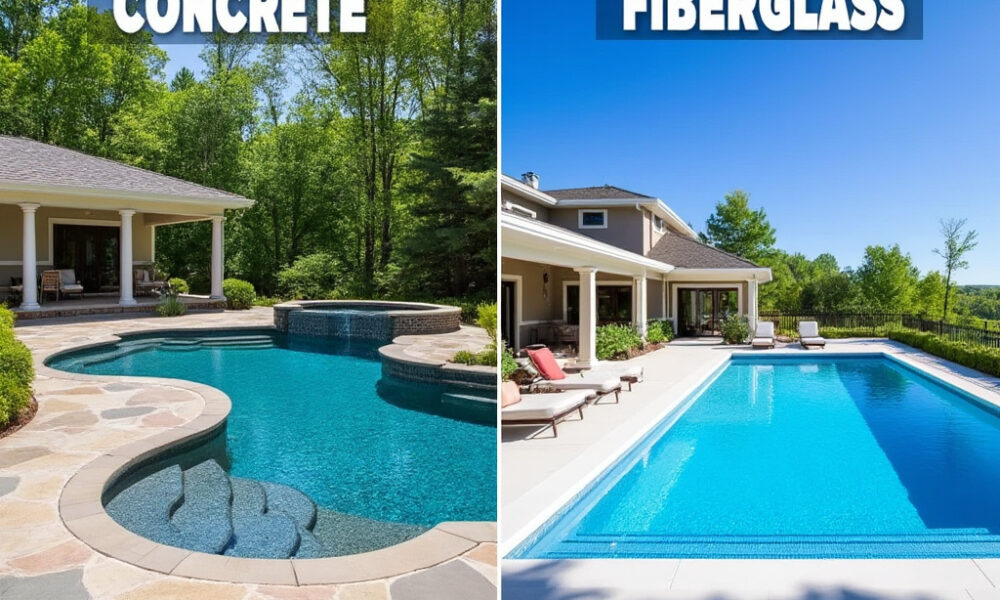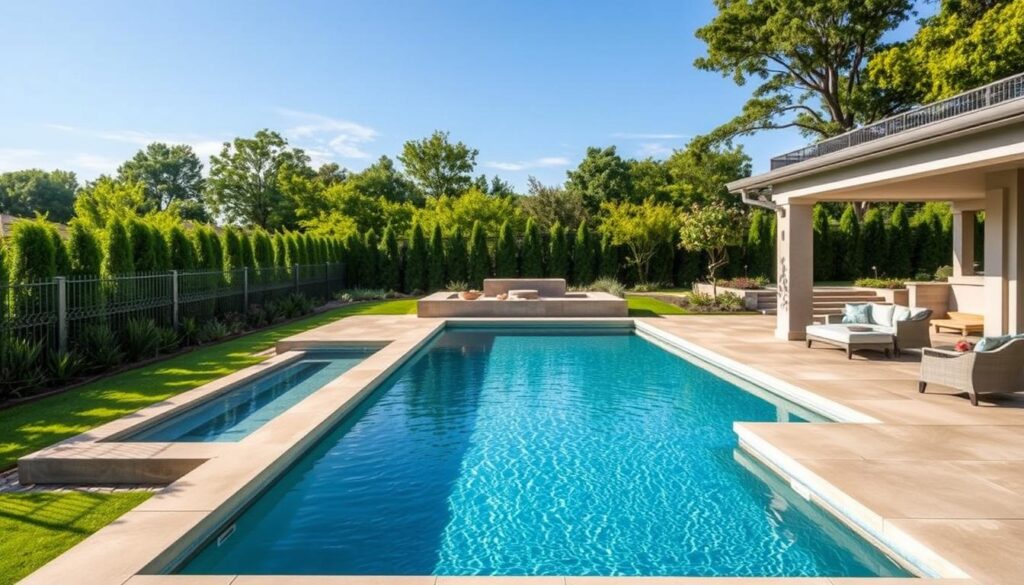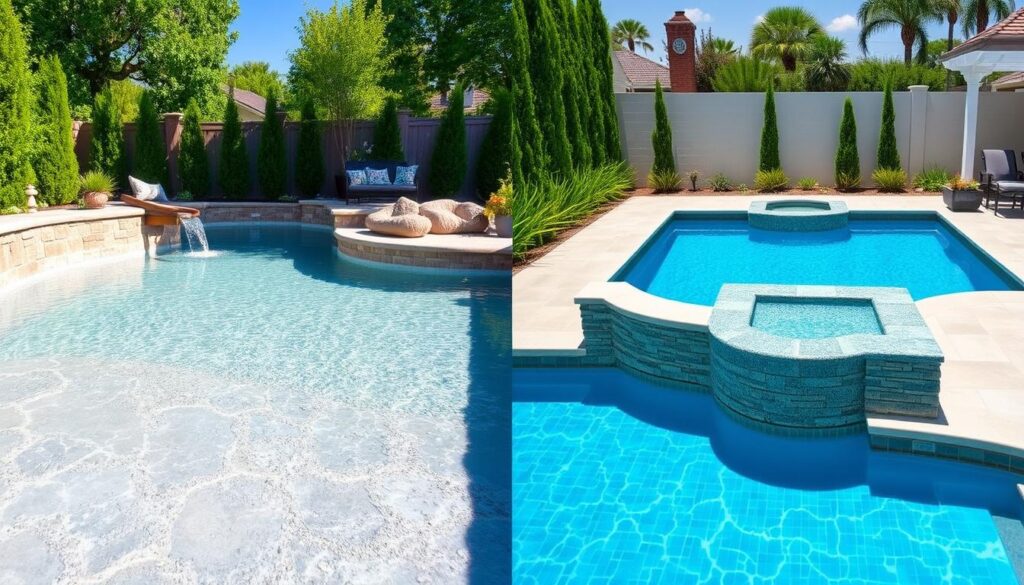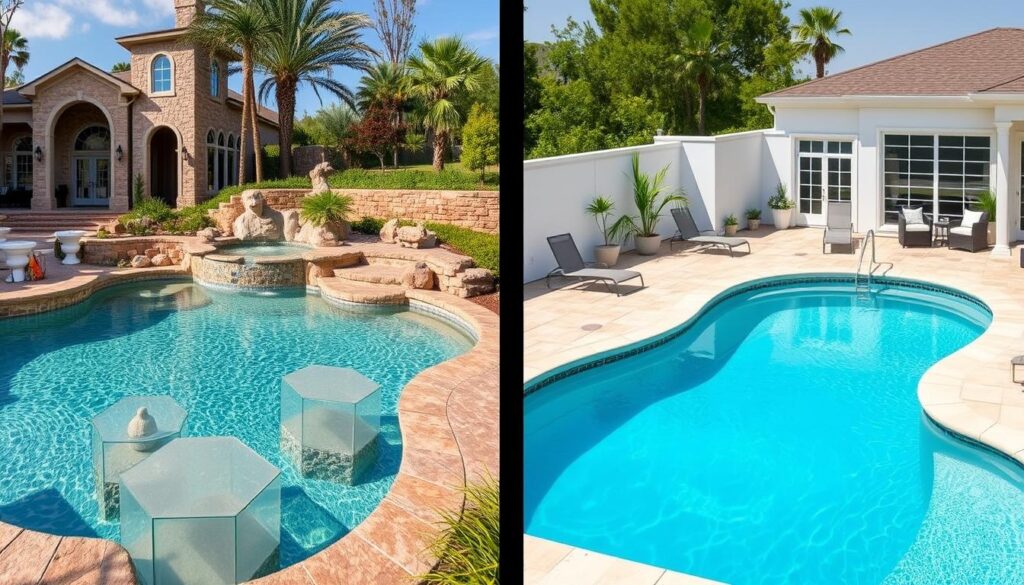
Concrete vs Fiberglass Pool: Which is Best for You?
Choosing the right pool for your backyard is a big decision, and one of the key choices you’ll face is deciding between a concrete vs fiberglass pool. Each type offers distinct benefits, making it crucial to understand their differences. In this guide, we’ll explore the main distinctions between concrete and fiberglass pools to help you decide which option fits your needs, budget, and overall vision for your backyard oasis.

Key Takeaways
- Concrete pools offer unparalleled customization and design flexibility, while fiberglass pools provide a quicker installation process.
- Concrete pools are known for their durability and longevity, but fiberglass pools require less maintenance over time.
- The initial cost of a concrete pool is generally higher, but fiberglass pools may have higher long-term operating expenses.
- Factors like climate, local regulations, and personal preferences will play a significant role in your final pool selection.
- Consulting with experienced pool contractors, like Baytown Custom Pools, can help you make an informed decision that suits your unique needs and budget.
Understanding the Differences Between Concrete and Fiberglass Pools
Choosing between concrete and fiberglass pools is a big decision. Knowing how each is made helps homeowners pick the best one for their needs.
Material Composition and Construction Techniques
Concrete pools use a steel-reinforced concrete structure poured on-site. This makes a strong, customizable pool that fits any backyard. Fiberglass pools, made from resin, fiberglass, and other materials, are pre-made and installed as one piece. They have a smooth finish.
Durability and Longevity Factors
Both concrete and fiberglass pools have their strengths. Concrete pools last 50 to 100 years, making them very durable. Fiberglass pools, lasting 20 to 30 years, are also durable with the right care. Climate, maintenance, and use affect both pools’ durability and lifespan.

Knowing the unique traits of concrete and fiberglass pools helps homeowners choose wisely. It’s about matching the pool to their budget, lifestyle, and future plans for their outdoor space.
Concrete vs Fiberglass Pool: The Cost Comparison
Choosing between a concrete or fiberglass pool involves considering the cost. We’ll look at the costs for each type and see which fits your budget better.
The initial installation cost of a concrete pool is higher than a fiberglass pool. Concrete pools need more site prep and take longer to build, costing more upfront. Fiberglass pools, however, are quicker and simpler to install, making them cheaper at first.
But, the long-term maintenance and operating expenses are different. Concrete pools might need more resurfacing and repairs, increasing costs over time. Fiberglass pools, though, have lower maintenance costs and are less likely to crack, saving money in the long run.
When looking at the pool installation cost, think about both the initial and long-term costs. A concrete pool might cost more upfront, but could save money on maintenance and repairs later. This makes it a cost-effective choice in some cases.

The choice between concrete and fiberglass pools depends on your preferences, budget, and project needs. Talking to pool experts can help you understand the pros and cons. They can guide you to the best choice for your situation.
Maintenance and Upkeep: Which Pool Type is Easier?
Keeping a pool clean is key for pool owners. The effort needed can differ a lot between concrete and fiberglass pools. We’ll look at cleaning, chemical use, and repairs for each pool type. This will help you choose the best pool for your life and budget.
Cleaning and Chemical Requirements
Fiberglass pools need less cleaning and chemicals than concrete pools. Their smooth surface is less likely to get algae. Cleaning is simple with a brush or vacuum.
Pool maintenance for fiberglass pools includes skimming, brushing, and shocking with chlorine or other sanitizers.
On the other hand, pool cleaning for concrete pools is harder. Concrete’s surface traps dirt and algae, needing more brushing, vacuuming, and pool chemicals to keep water clear.
Resurfacing and Repair Considerations
- Fiberglass pools are more durable and less likely to crack or stain, needing less pool resurfacing.
- Fixing a fiberglass pool, like small cracks or chips, is simpler and cheaper than concrete pool repairs.
- Concrete pools might need resurfacing every 10-15 years for cracks, stains, or finish wear.
Fiberglass pools are easier to maintain, needing fewer chemicals and less resurfacing or repairs over time.
Aesthetic Appeal: Customization Options for Concrete and Fiberglass Pools
Building your dream pool means focusing on looks as much as function. Both concrete and fiberglass pools have many customization options. They help you make a unique outdoor space that matches your backyard’s style.
Pool Shape, Size, and Design Versatility
Concrete pools stand out for their pool design flexibility. You can choose from many shapes, like classic rectangles or freeform designs. Fiberglass pools also offer customization, thanks to new manufacturing methods.
Want a dramatic, free-flowing pool shape or a modern pool size? Both concrete and fiberglass can be adjusted to fit your backyard perfectly.
- Explore a variety of shapes, from classic rectangles to bold, freeform designs.
- Customize the size of your pool to fit your outdoor living space perfectly.
- Incorporate unique features like beach entries, infinity edges, and custom water features.
- Choose from a wide selection of colors, textures, and finishes to achieve your desired aesthetic.
With a skilled pool designer, you can make a pool that looks amazing with your home and yard. It turns your backyard into a relaxing and fun oasis.
Concrete vs Fiberglass Pool: Environmental Impact and Energy Efficiency
As we become more aware of our environmental impact, choosing between concrete and fiberglass pools is key. Both types have different effects on water use, energy, and sustainability.
Fiberglass pools tend to have a smaller carbon footprint. They are made with less energy than concrete pools. Plus, they can include features like efficient water flow and advanced filters for better sustainability.
Concrete pools, however, hold heat better, which might save on heating costs. But, they also use more energy to keep the water warm.
- Fiberglass pools generally have a smaller environmental impact due to the manufacturing process.
- Fiberglass pools can be designed with sustainable features like energy-efficient circulation and filtration systems.
- Concrete pools may have better thermal properties, potentially reducing heating costs, but this benefit can be counterbalanced by increased energy consumption.
Choosing between concrete and fiberglass pools depends on what matters most to you and your local climate. By looking at each pool’s environmental and energy use, you can pick one that fits your eco-friendly and energy-saving goals.
Safety Considerations: Slip Resistance and Child-Friendly Features
Safety is key when you own a pool. The choice between concrete and fiberglass pools affects your pool’s safety. Let’s look at how each pool type offers safety and fun for your family.
Non-Slip Surfaces and Pool Entry Options
Slip resistance is crucial for pool safety. Concrete pools have a textured surface that helps prevent slips. Fiberglass pools can have special coatings for better pool slip resistance.
Both concrete and fiberglass pools have child-friendly pool options. Gentle steps or zero-depth entries make it safer for kids to get in. Handrails and non-slip surfaces add to the safety and confidence.
When choosing a pool, pool safety should be your main concern. By focusing on slip resistance and child-friendly features, you can make your backyard a safe and fun place for everyone.
Installation Process: Timelines and Site Preparation
The concrete vs fiberglass pool installation process varies, impacting the timeline and site preparation. Understanding these differences is essential for effective planning and budgeting during your pool construction.
Professional Installation Requirements
Concrete pools need more pool site preparation than fiberglass pools. This includes digging, laying a concrete base, and waiting for it to set. The whole pool installation for a concrete pool can take weeks to months, depending on the project.
Fiberglass pools, on the other hand, are quicker to install. Their pre-made shells are delivered and placed in a dug area. This requires less pool site preparation. The pool construction process for a fiberglass pool can be done in days or weeks, saving time and effort.
- Concrete pools require extensive pool site preparation and a longer pool construction process
- Fiberglass pools have a faster pool installation timeline with less pool site preparation required
- Factors such as project complexity and local regulations can impact the overall pool installation timeline
It’s crucial to hire experienced pool installation pros for any pool type. They’ll help you through the pool construction process and ensure the site is ready. This ensures a smooth and timely pool installation, so you can enjoy your new outdoor space soon.
Local Climate and Geographical Factors to Consider
Choosing the right pool for your backyard is important. You need to think about the pool climate considerations and pool geographic factors. These affect how well your pool works and lasts.
Temperature changes and soil types are key. They help decide which pool is best for your area.
Let’s look at the main points:
- Temperature Variations: If your area has very hot summers and cold winters, pick a pool that can handle it. It should stay strong and look good.
- Humidity Levels: High humidity can be tough on some pools. It can make water evaporate fast and grow algae. Knowing your humidity helps pick the right pool material.
- Soil Conditions: The soil in your yard affects your pool’s foundation and how long it lasts. Some pools work better on certain soils, like clay or sand.
By looking at these pool climate considerations and pool geographic factors, you can choose wisely. This ensures your pool will be a great spot for fun and relaxation for years.
Baytown Custom Pools: Experts in Pool Construction
Baytown Custom Pools is a top choice for pool construction in the area. They have years of experience and a team of pool construction experts. They can help you choose between concrete and fiberglass pools and guide you through the construction process.
Call (346) 567-6456 for a Free Consultation
Thinking about a new pool or renovation? Baytown Custom Pools is ready to help. Call (346) 567-6456 for a free pool consultation. Start your backyard makeover today. Their experts will listen to your needs, preferences, and budget. They’ll create a plan just for you.
Baytown Custom Pools offers many services:
- Concrete pool construction
- Fiberglass pool installation
- Pool renovations and resurfacing
- Custom water features and accessories
- Ongoing maintenance and repair services
Baytown Custom Pools is known for quality and customer satisfaction. They are among the best Baytown Custom Pools in the area. Let them turn your outdoor space into a beautiful, functional pool for your family to enjoy.
Conclusion
The choice between a concrete vs fiberglass pool depends on your preferences, budget, and backyard needs. Concrete pools offer more customization, while fiberglass pools are easier to maintain. Both come with their own advantages.
When deciding, consider the cost, durability, and environmental impact. This helps you choose the right pool for your goals. Our pool comparison summary aims to guide you in making the best choice for your outdoor space.
Choosing between a concrete vs fiberglass pool is a personal decision. With the insights from this article, you can make a confident choice that will help you create the perfect backyard retreat.
FAQ
What are the key differences between concrete and fiberglass pools?
Concrete pools are made on-site and can be customized. Fiberglass pools are pre-made and have a smooth surface. They differ in material, construction, durability, and how long they last.
Which pool type is more cost-effective?
Fiberglass pools cost less to install upfront. But, concrete pools might save money in the long run. This depends on several factors.
How do the maintenance requirements differ between concrete and fiberglass pools?
Fiberglass pools need less cleaning and simpler chemical care. Concrete pools might need resurfacing and use more water because they’re porous.
What are the customization options for concrete and fiberglass pools?
Concrete pools can be shaped and finished however you want. Fiberglass pools come in various shapes and colors but are less customizable.
How do concrete and fiberglass pools perform in different climates and geographical locations?
The climate and soil where you live can affect both pool types. Temperature, humidity, and soil type are important to consider when choosing a pool.
What safety features are important to consider when choosing between concrete and fiberglass pools?
Both should have slip-resistant surfaces and safe entry points. The safety features depend on the pool’s design and materials.
How does the installation process differ between concrete and fiberglass pools?
Concrete pools need more site prep and take longer to build. Fiberglass pools are quicker to install because they’re pre-made and easy to transport.

